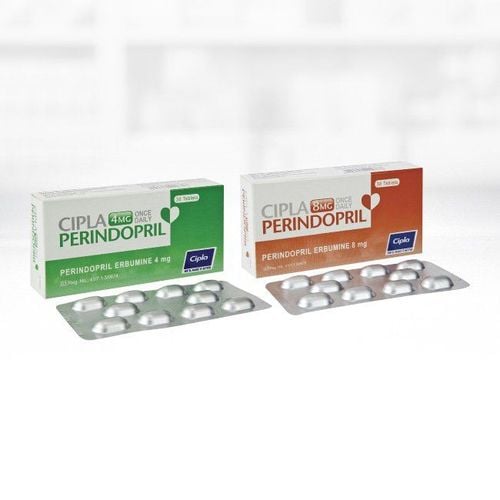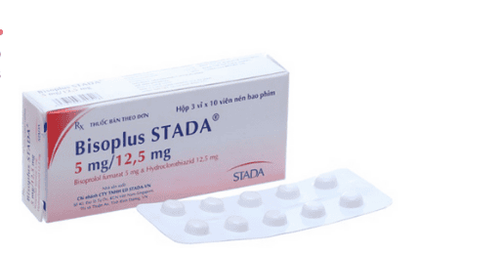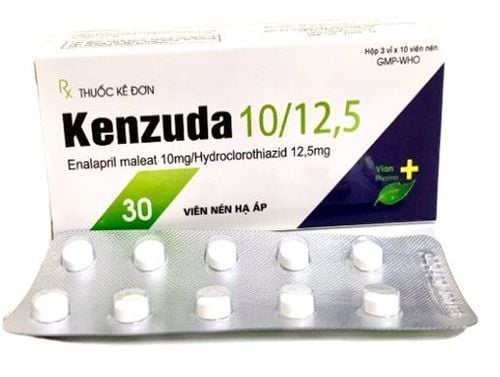This is an automatically translated article.
Bisoprolol Plus HCT 2.5/6.25 is a prescription medication used in the treatment of certain medical conditions. So what is Bisoprolol Plus HCT 2.5/6.25 and how to use it? Please read the article below.
1. What is Bisoprolol Plus HCT 2.5/6.25?
Bisoprolol Plus HCT 2.5/6.25 is a medicine to treat hypertension, made in the form of film-coated tablets with the main ingredients in each tablet being:
Bisoprolol fumarate 2.5 mg; Hydrochlorothiazide 6.25mg. Bisoprolol Plus HCT 2.5/6.25 is a combination preparation for the treatment of hypertension, consisting of a selective beta 1 blocker and a thiazide diuretic.
Bisoprolol is a selective beta 1 - adrenergic blocker (cardiac selective drug). At therapeutic doses, Bisoprolol has no intrinsic sympathomimetic activity or membrane stabilization. Active substance Bisoprolol has a low affinity for beta 2 - adrenergic receptors on bronchial and vascular smooth muscle as well as for beta 2 - adrenergic receptors involved in metabolic regulation.
To date, the antihypertensive mechanism of Bisoprolol has not been fully determined, it may be due to several mechanisms:
Decreased cardiac output; Inhibits the release of renin by the kidneys.; Affects vasomotor centers in the brain. The hydrochlorothiazide in Bisoprolol Plus HCT 2.5/6.25 is a diuretic that increases urine output, eliminates excess fluid in the body, and helps lower blood pressure.
Bisoprolol Plus HCT 2.5/6.25 is indicated in the following cases:
Mild to moderate hypertension in patients suitable for combination therapy. Bisoprolol Plus HCT 2.5/6.25 is contraindicated in the following cases:
People who are hypersensitive to Bisoprolol fumarate, Hydrochlorothiazide or other Thiazides, Sulfonamides or any component of Bisoprolol Plus HCT 2.5/6.25; People with decompensated heart failure, cardiogenic shock, 2nd or 3rd degree atrioventricular block, sinoatrial block, sinus node disorder, marked bradycardia, excessive hypotension. Severe bronchial asthma or severe chronic obstructive pulmonary disease; Peripheral artery occlusive disease; Raynaud's syndrome; metabolic acidosis; Pheochromocytoma; Concomitant use with monoamine oxidase inhibitors; Patients with anuria, hyperuricemia and gout; Addison's disease ; Hypercalcemia; Severe liver or kidney failure; Use in combination with lithium-containing preparations; Pregnant and lactating women.
2. Dosage and how to use Bisoprolol Plus HCT 2.5/6.25
The dose of Bisoprolol Plus HCT 2.5/6.25 should be according to the prescription of a specialist. The recommended dose for adults is as follows:
The starting dose is 1 tablet/time/day; No dose adjustment of Bisoprolol Plus HCT 2.5/6.25 is necessary in patients with mild to moderate renal or hepatic impairment. How to take Bisoprolol Plus HCT 2.5/6.25:
The drug is used orally, you should take it in the morning with or without food. Swallow the tablet whole with water and do not chew. Duration of treatment with Bisoprolol Plus HCT 2.5/6.25:
Usually, treatment for hypertension is long-term. If Bisoprolol Plus HCT 2.5/6.25 is discontinued, the dose should be gradually reduced because abrupt discontinuation may lead to a rapid deterioration in the patient's condition, especially in those with ischemia. Overdose of Bisoprolol Plus HCT 2.5/6.25 and management:
Symptoms of overdose related to Bisoprolol fumarate: Signs of Bisoprolol overdose usually include bradycardia, bronchospasm, hypotension, atrial block - 2nd or 3rd degree ventricles, acute heart failure, and hypoglycemia. Management of Bisoprolol overdose:
Usually requires discontinuation, symptomatic and supportive treatment; Bradycardia: Treatment with intravenous atropin. If the patient does not respond, isoprenaline or other drugs with a pacing effect can be used with caution. In some cases, the doctor may place a pacemaker; Hypotension: Treat with intravenous fluids and drugs that increase blood pressure. Intravenous glucagon may also be used in this case; Atrioventricular block - second or third degree: The patient should be closely controlled and treated with intravenous isoprenaline or pacemaker; Acute heart failure: Treatment with intravenous diuretics, drugs that cause muscle contractions and vasodilators; Bronchospasm: Treat with bronchodilator therapy with isoprenaline, sympathomimetic and/or Aminophyllin. Hypoglycemia: Treat with intravenous glucose infusion.
3. Side effects of Bisoprolol Plus HCT 2.5/6.25
Generally, treatment with Bisoprolol Plus HCT 2.5/6.25 is well tolerated. The adverse effects of Bisoprolol Plus HCT 2.5/6.25 are mostly mild and transient, and do not require discontinuation of the drug.
Side effects of Bisoprolol Plus HCT 2.5/6.25 related to Bisoprolol include:
Common side effects: Fatigue; Dizzy; Headache ; Nausea, vomiting; Diarrhea; Constipation; Feeling cold or numb in the extremities. Less common side effects include: Sleep disturbance including nightmares; Depression; Lower blood pressure ; slow heart rate; Bronchospasm; Shortness of breath; Muscle weakness and cramps. Rare side effects include: Hallucinations; Itching, flushing, rash; Increased liver enzymes, hepatitis; Aggravation of psoriasis; Baldness is reversible. Side effects of Bisoprolol Plus HCT 2.5/6.25 related to Hydrochlorothiazide include:
Common side effects: Fatigue, dizziness, dizziness, headache; Decreased blood potassium; Hyperuricemia ; Increased blood glucose; Hyperlipidemia (at high doses). Uncommon side effects: Postural hypotension; Arrhythmia ; Nausea, vomiting; Anorexia; Constipation; Diarrhea; Urticaria; Rash; Hypomagnesemia; Hypercalcemia; Leukopenia, agranulocytosis, thrombocytopenia; Anemia; Paresthesias; Sleep disorders ; Depression; Vasculitis; Hepatitis; Cholestatic jaundice; Pancreatitis; Shortness of breath; CKD; Interstitial nephritis ; Blurred eyes. If you experience any side effects of Bisoprolol Plus HCT 2.5/6.25, tell your doctor or go to the nearest medical facility for timely treatment.
4. Interactions with other drugs
Drug interactions related to Bisoprolol Fumarate:
ACE inhibitors and Clonidine when used together with Bisoprolol Plus HCT 2.5/6.25 will increase the antihypertensive effect of Bisoprolol; Concomitant use of Bisoprolol Plus HCT 2.5/6.25 with calcium channel blockers of the Dihydropyridine class (such as nifedipine) may increase the risk of hypotension. In patients with underlying cardiac dysfunction, this combination may lead to heart failure; Co-administration of Bisoprolol Plus HCT 2.5/6.25 with antiarrhythmic drugs and some calcium blockers may contribute to bradycardia, heart block; Drugs that cause hypotension such as Aldesleukin and anesthetics will enhance the antihypertensive effect of Bisoprolol, while non-steroidal anti-inflammatory drugs have an antagonistic effect on this effect; Monoamine oxidase inhibitors when used with Bisoprolol Plus HCT 2.5/6.25 may increase the antihypertensive effect; Bisoprolol in Bisoprolol Plus HCT 2.5/6.25 may increase bradycardia due to Digoxin; Decreased response to adrenaline in the treatment of anaphylaxis may occur in patients receiving long-term treatment with Bisoprolol Plus HCT 2.5/6.25; Atrial-ventricular conduction time is increased when Bisoprolol Plus HCT 2.5/6.25 is co-administered with parasympathomimetic stimulants (including tacrine); Using a combination of sympathomimetic drugs and Bisoprolol Plus HCT 2.5/6.25 reduces the effect of both drugs; Rifampicin slightly reduced the half-life of Bisoprolol in Bisoprolol Plus HCT 2.5/6.25 by induction of hepatic drug-metabolizing enzymes; Prostaglandin synthesis inhibitors will reduce the antihypertensive effect of Bisoprolol Plus HCT 2.5/6.25. Drug interactions related to Hydrochlorothiazide:
Alcohol, Barbiturates or narcotic sleeping pills when used with Bisoprolol Plus HCT 2.5/6.25 will increase the orthostatic hypotension potential; Antidiabetic drugs (oral drugs and insulin) will require dose adjustment because the thiazides in Bisoprolol Plus HCT 2.5/6.25 reduce glucose tolerance; Other antihypertensive drugs when used with Bisoprolol Plus HCT 2.5/6.25 increase the antihypertensive effect; Cholestyramine resin or colestipol when used with Bisoprolol Plus HCT 2.5/6.25, has the ability to bind Thiazide diuretics, thereby reducing the absorption of these drugs from the gastrointestinal tract; Corticosteroids, ACTH used together with Bisoprolol Plus HCT 2.5/6.25 will increase electrolyte loss, especially hypokalemia; Hypertensive amines (e.g. adrenaline): Bisoprolol Plus HCT 2.5/6.25 may reduce response to hypertensive amines, but not enough to preclude use; Muscle relaxants (eg tubocurarin): Bisoprolol Plus HCT 2.5/6.25 may increase response to muscle relaxants; Lithium: Should not be used with Bisoprolol Plus HCT 2.5/6.25 because the diuretic component will reduce the renal clearance of Lithium and increase its toxicity; Nonsteroidal anti-inflammatory drugs, including COX-2 inhibitors, may reduce the diuretic and antihypertensive effects of Bisoprolol Plus HCT 2.5/6.25 in some patients. Above is information about uses, dosage and precautions when using Bisoprolol Plus HCT 2.5/6.25. To ensure safety for your health and maximize the effectiveness of your treatment, you need to take Bisoprolol Plus HCT 2.5/6.25 exactly as directed by your doctor.
Please dial HOTLINE for more information or register for an appointment HERE. Download MyVinmec app to make appointments faster and to manage your bookings easily.













